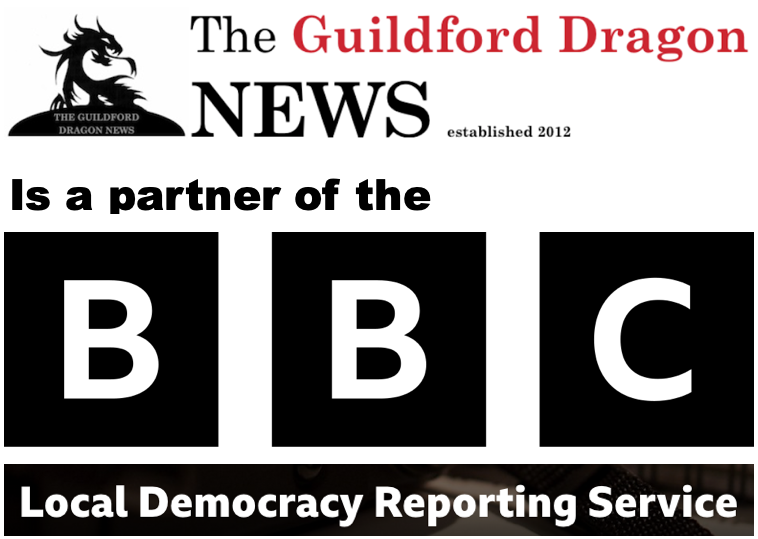- Monday, August 11, 2025
- Stay Connected
 Abraham Lincoln
If given the truth, the people can be depended upon to meet any national crisis...
Abraham Lincoln
If given the truth, the people can be depended upon to meet any national crisis...
 Guildford news...
for Guildford people, brought to you by Guildford reporters - Guildford's own news service
Guildford news...
for Guildford people, brought to you by Guildford reporters - Guildford's own news service
Opinion: Listening to Communities Is How to Shape the Journalism of the Future
Published on: 11 Jun, 2017
Updated on: 11 Jun, 2017

The Guildford Dragon NEWS recently registered with the Centre for Community Journalism, run by the University of Cardiff, which provides networking, advice, training, research and monitoring of the growing online “hyperlocal” media.
The centre’s focus is on the local level; the place where journalism is most valued, but also most at risk.
We concur, and with the author’s permission are re-publishing a slightly abridged version of an article first published on the centre’s website.
The article concludes with a quote: “People are prepared to pay for quality journalism – The Times is proof of that.” Would you be prepared to pay for The Dragon? We’d be interested to hear your views.
By Matt Abbott
It may be that journalism can be saved. But it won’t be by journalists writing articles about what needs to be done. It will be by an informed citizenry, according to Jeff Jarvis, professor and director of the Tow-Knight Center for Entrepreneurial Journalism (March 15, 2017).
He was speaking at the Guardian Changing Media Summit 2017 on whether technology distorts the truth, and how readers can assess trust and authority in a platform age.
 “Journalists are bad at listening,” Jarvis said. “We think we inform the public debate when, in fact, we should be reflecting the debate by listening more carefully to the needs of the community, and then deliver context-specific journalism.”
“Journalists are bad at listening,” Jarvis said. “We think we inform the public debate when, in fact, we should be reflecting the debate by listening more carefully to the needs of the community, and then deliver context-specific journalism.”
The prescription Jarvis gave was for the present misinformation sickness afflicting ‘mass media’ – an idea, he says, that no longer exists: “we are in a post-mass age”.
It is true. Although the media has always been partisan it needs to find ways of working together creatively to bring about significant change.
Independent community publishers do not escape Jarvis’s sermon, they are in the enviable position of being able to eavesdrop on these conversations in real-time, due to their proximity to their audience.
Furthermore, levels of innovation are staggeringly high in the hyperlocal sector. Publishers are less likely to have to jump through corporate hoops in order to experiment with new technologies, ideas and platforms. In some respects, they are the beta testers for the whole industry.
Could these publishers, therefore, provide insight into how the future of journalism can be shaped with individuals and the community in the driving seat?
Perhaps. But Jarvis believes we need to go one step further. If journalists are bad at listening, then the old trope that the public should become media literate needs to be inverted. “The media needs to become ‘public literate’,” he said.
Digital giants will be the educators here, teaching media how to build and connect relationships and personalisation with information and brands.
Talking with Patrick Walker, Facebook’s Director of Media Partnerships for Europe, Middle East & Africa, Jarvis said that digital giants have done a much better job at educating people on what ‘real’ content is, vs fake and paid-for content.
As a trade-off, Facebook, Google and other platforms need to a better job at surfacing brands, so that readers can be sure they are accessing trusted sites.

The most popular sound-bite came when he talked of advertisers’ obsessions with reach. “Reach,” he said, “leads to cats, Kardashians, and crap.” Meaning that if we don’t understand the audience well enough, we’ll keep serving them the same old worthless fodder time and again.
“Let’s bring memes to journalism, wikis, and social tokens as valuable ways to disseminate news,” he said.
He closed the talk on a positive note with a nod to the Gutenberg Press.
The printing press was invented by German Johannes Gutenberg in 1440. It took another 77 years before Martin Luther nailed his Theses to the door of the All Saint’s Church, in Wittenberg. And it wasn’t until 1690 that the world got its first newspaper.
“It’s very possible,” Jarvis said, “that our Martin Luther is yet to be born.”
For those wishing to target and recruit younger audiences, Shortlist Media CEO, Ella Dolphin extolled the virtue of the email newsletter saying, “they just seem to like them.”
And CCO of News UK, Dominic Carter gave a boost to publishers with, or considering rolling out paywalls saying: “People are prepared to pay for quality journalism – The Times is proof of that.”

















A Tatlow
June 11, 2017 at 5:15 pm
I do sometimes think the media want to “make” the news rather than report it. They seem unable to wait.
I feel sorry for our hard working politicians who are dragged early from their beds to be asked what will be in their speech to be delivered later in the day. Wait and find out!
I don’t think The Dragon is guilty of dragging many politicians “from their beds”. Our main gripe is that some cannot even be bothered to reply to polite requests for comment. Ed